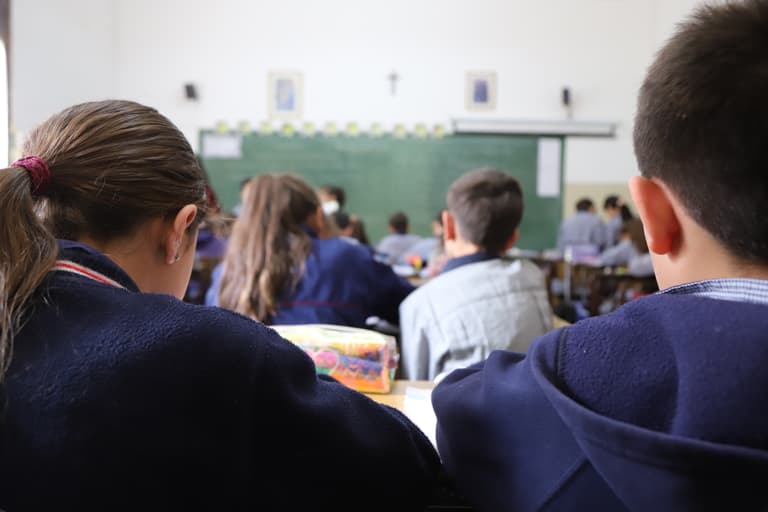
Education
School choice fuels Catholic school growth
Ray Carter | June 11, 2025
Thanks to robust school-choice programs that are open to nearly all families, enrollment in Catholic private schools has surged in several states, according to a new study.
That’s in sharp contrast to the trend in non-school-choice states, which have experienced significant enrollment declines at Catholic schools over the last decade.
The report shows Catholic schools in Oklahoma have enjoyed steady growth in enrollment since 2021, and local officials credit part of that growth to the existence of the Oklahoma Parental Choice Tax Credit (PCTC) program, which provides state families with refundable tax credits of $5,000 to $7,500 per child to pay for private-school tuition. The largest credits go to families with the lowest incomes.
“We added 500 kiddos to our overall student base of kids,” said Lara Schuler, senior director of Catholic Education for the Archdiocese of Oklahoma City. “Next year looks to be higher.”
A report issued by the Florida Catholic Conference and Step Up For Students noted there is a stark difference in enrollment trends from state to state, based in part on school-choice policies.
“Over the past decade, no state in the Top 10 for Catholic school enrollment has seen a bigger drop than New York (-31.0%)—and no state has seen more growth than Florida (+12.1%),” the report stated. “There’s every reason to believe those trends will continue, given Florida’s embrace of school choice—and, in New York, lawmakers’ continued resistance.”
“We added 500 kiddos to our overall student base of kids. Next year looks to be higher.” —Lara Schuler, Archdiocese of Oklahoma City
In most states, Catholic enrollment declined in 2021 due to Covid disruptions. But enrollment growth in Florida’s Catholic schools has been dramatic since that time, surging from 77,689 in 2021 to 92,863 in 2025, a 19.5 percent increase.
Florida’s numbers are notable because the state has had significant school-choice programs in place much longer than other states around the country, making it easier for many Florida students to access a private-school education.
“For years, Florida has been the lone outlier. But as education choice continues its historic march across America, it’s no longer hard to envision other states joining Florida in the growth column,” the Step Up For Students report stated. “Indeed, the latest figures from the National Catholic Educational Association show year-over-year growth in several states with big Catholic school sectors and substantial choice programs, including Iowa (+2.4%), Wisconsin (+1.3%), and Ohio (+0.7%).”
In Oklahoma, the report shows the high point for private Catholic school enrollment in the last 10 years occurred in 2019, pre-COVID, when 9,710 Oklahoma students were enrolled in Catholic schools. That figure fell to 8,925 in 2021 due to COVID-19 disruptions, but has steadily increased each year since, hitting 9,458 in 2025.
The public-school shutdowns that occurred during COVID generated increased parental awareness of academic quality, which prompted many families to shift to private schools.
With next year’s anticipated increase in enrollment, Oklahoma Catholic schools will be serving more students than at any time in the last decade.
In fact, demand for private Catholic school education in Oklahoma exceeds the supply in many locations, as many schools now have more students applying for admission than there are spaces available.
Schuler said the Catholic school system is working on expanding the number of students its schools can serve and is working to facilitate additional student growth in the next few years.
She said the increase in Oklahoma Catholic school enrollment has been “substantial, especially when compared to the other states where the enrollment was negative.”
Schuler said several factors are driving the increase, but the existence of the Oklahoma Parental Choice Tax Credit program is among the major causes. The public-school shutdowns that occurred during COVID also generated increased parental awareness of academic quality, which prompted many families to shift to private schools.
Enrollment growth has occurred at both urban and rural Catholic schools across Oklahoma.
“We’re getting quite a few families that otherwise would not be able to afford it.” —Lara Schuler, Archdiocese of Oklahoma City
Families from a wide range of economic backgrounds are applying, but low-income and middle-class families are a significant share of new students, and those families are arriving thanks to the Oklahoma Parental Choice Tax Credit program.
“We’re getting quite a few families that otherwise would not be able to afford it,” Schuler said.
Schuler said the Oklahoma Tax Commission has also made the process “much easier” for participating schools in the program’s second year, which has helped more families access the school-choice program.
The benefits of Oklahoma’s school-choice programs include not only access to a private-school education for working-class families, but ultimately much better academic outcomes for those children, the Step Up For Students report noted.
“A decade ago, as our colleague Matthew Ladner pointed out, Catholic school students were outperforming their public-school peers by a grade level to a grade and a half on NAEP tests in reading and math,” the report stated. “But the most recent NAEP results, released in January, show the ‘Catholic school advantage’ has grown on some of those tests to nearly two grade levels.”

Ray Carter
Director, Center for Independent Journalism
Ray Carter is the director of OCPA’s Center for Independent Journalism. He has two decades of experience in journalism and communications. He previously served as senior Capitol reporter for The Journal Record, media director for the Oklahoma House of Representatives, and chief editorial writer at The Oklahoman. As a reporter for The Journal Record, Carter received 12 Carl Rogan Awards in four years—including awards for investigative reporting, general news reporting, feature writing, spot news reporting, business reporting, and sports reporting. While at The Oklahoman, he was the recipient of several awards, including first place in the editorial writing category of the Associated Press/Oklahoma News Executives Carl Rogan Memorial News Excellence Competition for an editorial on the history of racism in the Oklahoma legislature.